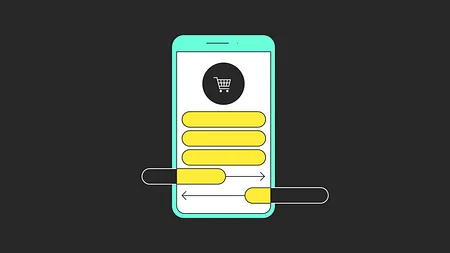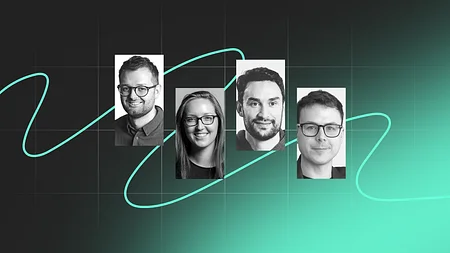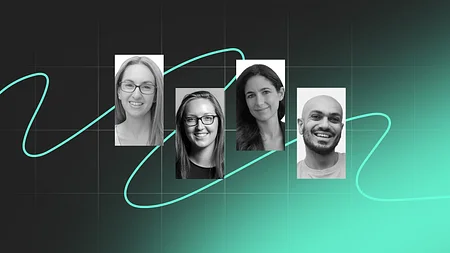Women in Fintech: What does the future hold?
Following hot on the heels of International Women’s Day yesterday, we have some fantastic insights from some leading women in UK fintech.
I spoke to Rachel Kent – Head of Global Financial Institutions Sector, Hogan Lovells; Wendy Jephson – Co-founder & Chief Behavioural Specialist, Nasdaq Sybenetix; Sophie Bialaszewski – Head of Innovation, Lloyds Banking Group, Adizah Tejani, Marketing Director at Token, Inc; and Min Teo – VP of Operations, Yoyo Wallet.
Listen to the interviews in full on Fintech Insider here or stream them below.
As a producer of Fintech Insider, usually I do my work very much away from the microphone. But, as someone nearer the start of their career in fintech, I wanted to find out what the road ahead might look like.
I had the opportunity to speak to five of the women who featured on the Innovate Finance Women in Fintech Powerlist and I wanted to know about their experiences in fintech. What had it been like to start their career? How has it changed over time? And where do they see the opportunities for women within the sector and addressing the gender imbalance as a whole?
Why do you think it’s so important to highlight the contributions of women particularly in this industry?
Rachel Kent: I think it’s important for a variety of reasons. We are told by our young women that they feel that they don’t have enough role models. I understand that, and I feel very strongly that we need to remedy that, but I also feel very strongly that we can remedy that. In our sector, within Hogan Lovells, I lead the sector, the management committee representative that I report to is a woman, and the Head of Sectors, who I also report to, is a woman. We have a lot of really strong senior women. For us, I think it’s more about getting the message out. So, you know, explaining that, actually, yes, we do have children, and yes, we did find a way, and yes, it is possible. So, I think it’s possible to find a role model, and hopefully that will encourage people to see it that way. But in terms of why is it important that we actually achieve more gender diversity, I think that the benefit of having women in decision making roles, particularly on boards or management teams, because they see things differently, and bring just a different approach to things. So of course, to have more women at the top, you need to have more women at all levels that come before that."We are told by our young women that they feel that they don’t have enough role models. I understand that, but I also feel very strongly that we can remedy that" - Rachel Kent.This is very, very important, especially in an industry like the fintech industry, which is, of course, heavily focused on the tech part of fintech. We all know the difficulties of trying to attract women into that, and I think it’s a shame, I’d love to solve the actual women in technology itself problem, but even if, or for so long as that proves tricky, there are PR jobs, there are legal jobs, there are compliance jobs, there’s the COO job, the CEO job, and you don’t have to be a coder to do those. So, spreading the word, that it’s possible, whatever your interest and passion.
What do these successful women see as the future of fintech?
Min Teo: I think the fintech industry, when you think about its components, it’s finance, and also technology, and I think it’s a super interesting intersection between the traditional world of finance, the banks, and all the old guard financial institutions, and the up and comers being the disruptive fintechs. I think the path forward is definitely a collaborative one. There are a tonne of great incubation programmes and accelerators. BBVA is one of them that’s very involved in this space, and, they’re really opening up their platforms for fintechs to collaborate with them on. Regulation is also supportive of this, with Open Banking and PSD2. At the end of the day, I think it’s our fiduciary responsibility, as a fintech community, to deliver more value to customers, and think about how we can make our services more relevant for the future, and it’s going to require a cooperation between both banks and up and coming fintechs. Wendy Jephson: [It's] really exciting. There’s so much. It’s one of those things that you look at any other industry, without knowing a little bit about it, and think, “Oh, well, obviously that runs brilliantly,” and then you look under the hood, and realise, “Gosh, that’s not quite as slick as I thought it might be.” And there’s a huge amount of stuff that people still do manually. It’s not about replacing them, but you could take away the stuff that we’re not, actually, really very good at, as people. So that pace of innovation, and the opportunities for making everything just more effective and efficient, is huge, and there are so many people coming in to try. When my brother came up with the idea [for Sybenetix], technology wasn’t in a state to be able to cope with data. People weren’t in a mindset to let people have data. Whereas that’s totally changed. Organisations are saying, “There’s other people out there thinking really, really hard about this bit of the puzzle. I will let them do it, and I will buy it.” That’s shifted in the last four years. So I think it’s a huge opportunity and actually, that’s what’s really important, is making it for the better, and really thinking hard about the end user, and how does this affect the man or woman on the street. We sit in front of asset managers, and, there are some phenomenal people in finance. They get slated a lot, but they really worry about the people’s pensions that they’re investing, that people have worked hard, to put in their pot. So, there’s a huge amount of responsibility, and I think it’s on all of us, to really think carefully about everything that we do, and what the ultimate impact is out there in the world."What’s really important, is making it for the better, and really thinking hard about how does this affect the man or woman on the street." - Wendy JephsonSophie Bialaszewski: Great question! don’t have a crystal ball, so I’m not going to be able to predict everything, but I do think that collaboration is going to be ever more important. Perhaps if I was doing this interview, three and a half, four years ago, there was a real compete or die type mentality. And I found that the conversations on both sides, from large organisations and small, were less mature. I think now both understand a little bit more where the other one is coming from, and therefore the conversations are much better. I think that will continue, especially with PSD2, and I think, as a whole, within the sector, we’ll see a lot more collaborations. Adizah Tejani: I think that there’ll be more consolidation and competition, as new entrants that are not in financial services actually enter the financial services market. You’re seeing it with different tech companies having elements of payments in what they’re doing. I also think that the fintech industry is here to stay, but I also think that this is the fintech industry 2.0, as the fintech industry isn’t necessarily new. Some of the first computer technology was actually bought, firstly, by banks, in the codebreaking days. If you go to Bletchley Park, which is the home of British codebreaking here in the UK, you will be able to see the machines that banks were buying, in order to help them with technology to increase their processes, and to improve what they were doing. So, I think that, sometimes, the fintech industry does get a bit of flack when it’s like, “Oh my God, everything’s shiny and new!” Yes, there are elements that are shiny and new, but we can definitely take lessons from the past, in order to make sure that the future that we have is stronger and better for everybody involved. And that’s what Open Banking is supposed to be.
"We can definitely take lessons from the past, in order to make sure that the future that we have is stronger and better for everybody involved. And that’s what Open Banking is supposed to be." -Adizah Tejani
What do they think the future of the industry looks like, and how it can start addressing the gender imbalance that is currently in place?
Sophie Bialaszewski: Yes, it’s quite difficult, and like I said, I’ve worked in tech companies, I’ve worked with the defence sector, as well and all of those have some challenges. I think, for me, one of the key things is about offering flexibility. I came back from maternity leave this year, I took a year out, and I was able to come back and work three days a week, and I’ve just gone out and advertised, and actually recruited a job share, who will be starting towards the end of this year. I think the more opportunities that we provide for people, that they can come back to work on their terms, the better we’ll be, and we’ll see less of a gender imbalance. But I think it’s the flexibility, for me, that is key, if we’re going to tackle it."I think the more opportunities that we provide for people [...] the better we’ll be, and we’ll see less of a gender imbalance." - Sophie BialaszewskiRachel Kent: I think it’s extremely positive, because awareness, and consensus around the benefits that diversity bring, I think is very high at the moment, certainly higher than I’ve ever known it. I think the men in our lives have, you know, an obligation to step up and help, but I think we, also, as women, have an obligation to help ourselves. At Hogan Lovells, we are immersed in training, particularly as women, to understand that we don’t, on average, push ourselves forward. We don’t like to take risks, because we don’t like to fail. We do like to appear perfect, and we don’t like to appear bossy. And when you add all those things up, they can really manifest themselves as a tendency towards shrinking back, and holding back. A lot of my work recently has been focused on Brexit, and that has involved me speaking to the UK government extensively, but also going on delegations to Brussels, to interact with the Brexit negotiators, members of the EU 27 and so on. I’m frequently the only woman in our delegation, and occasionally, I’m the only woman in the room. And even if the meeting is established for me to report on a piece of work that I have personally conducted, and no one else in the room has, I find myself entering the room, going straight to the end of the table, in other words the least prominent seat. So, with my 25 years’ worth of self-confidence, and with my report clutched under my arm, I go and sit at the end of the table, rather than in the middle. And, interestingly, what did it take for me to stop doing that? We had a new member of our team join, who was a young chap, who noticed that I was doing that, and so he took it upon himself to always enter the meeting room first, and grab the chair right in the middle, in front of the most important person on the other side, and if any of the other men tried to sit in the chair, he would say, “No, Rachel is sitting here,” and he would make me go and sit there. So, it’s in ways, even little ways, like that, that men can play their part. LW: And women have to back themselves, as well. Rachel Kent: Absolutely. That joint responsibility, yes.
"As women, we don’t, on average, push ourselves forward. We don’t like to take risks, because we don’t like to fail. We do like to appear perfect, and we don’t like to appear bossy. And when you add all those things up, they can really manifest themselves as a tendency towards shrinking back, and holding back." Rachel Kent
What careers advice would they give anyone looking to start their career in fintech, especially women?
Min Teo: That’s a great question. I think, definitely, you know, keep a very, very open mind. Because one thing is that change is constant in this industry, and it can be quite technical, it can be quite daunting, but, there’s a tonne of innovation going on, and, if you look at, say, a company like Stripe, like, that was started by two very, very young brothers who didn’t have any experience in financial services, but brought, such a fresh idea to the space, and now have built a billion dollar company out of it. I think people just need to learn about the new disruptive technologies, and think about how they can just make the consumer value proposition more compelling."I think people just need to learn about the new disruptive technologies, and think about how they can just make the consumer value proposition more compelling." - Min TeoRachel Kent: I think two things. Perhaps one particular to being a female, which is, I couldn’t have put it better than you did earlier, which is back yourself. It’s interesting, I had never even heard of that expression until my daughter, who is 21, says it all the time, both about herself, “Oh, I must back myself,” but also about me. “You must back yourself.” And I think that’s absolutely right. I mean it's great, and it will be great, if men back us more, and continue to support us, and I genuinely hope that happens, but it would be a massive derogation of our own personal responsibility if we don’t try harder to back ourselves. So, I think that would probably be the main bit. The other bit, that I think is a bit more general, is I think it’s quite easy to come to work and think, oh no, that big project that I wanted, that was going to be awarded, went to the person in the room down the corridor, or in the new open plan area on floor 9, as we now have, but I really think that, you know, every day brings a new opportunity, and to not be downhearted, continue to be positive, and not see that as a failure, but an opportunity to get a bigger, better project, is the advice I’d give to anybody.
"It would be a massive derogation of our own personal responsibility if we don’t try harder to back ourselves." - Rachel KentSophie Bialaszewski : I think one of the things that I would say is, for people starting their career, is to explore a bit. Try out different sectors, try out different types of organisations, but make sure you work for an organisation that is the right cultural fit for you, as well. I think you need to be able to work in an organisation where you can be a leader, or work in a team, and do that very authentically. My advice would be to shop around a little bit, you no longer really have to pick the career that you’re going to do, do you? You can change around quite quickly, and actually, if someone came to me, and they had experience of working in the public and the private sector, and large and small organisations, then the better for it. So, experiment, jump around a bit, and learn some different things in the evening. On maternity leave, I did a drama class, and it was really eye opening. I hadn’t done that before, it put me out of my comfort zone, and I learnt a lot, actually, and got a lot of confidence for it. So, try some new things, as well. Listen back to the episode in full here. To ensure you never miss an episode, subscribe to Fintech Insider now! Come talk to us @11FSTeam or @FintechInsiders on Twitter or hello@11fs.com if you want to send us an email.




